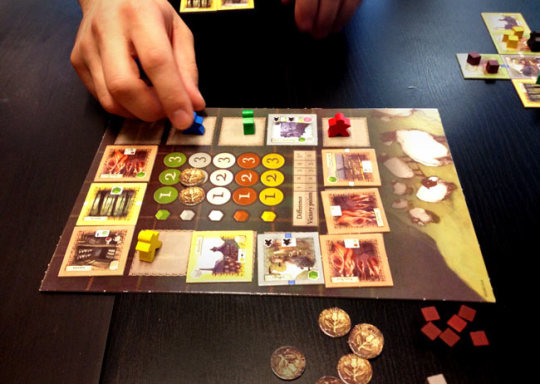
2015/04/24
This week we played one of the more complex board games we have played: Glen More. As you may have gathered, it’s a Scottish-themed game where each player represents a clan that is trying to expand its village…with sheep, land, and whiskey! As game & gamification designers, we love to see the full breadth of games out there, from simple-yet-fun games such as Sushi Go and Piece O’Cake, to relatively more complex games like 7 Wonders, and now Glen More.
In the game, players take turns collecting tiles. Each tile represents a village, resource, castle, tavern, or distillery, and they all have varying costs and advantages. Tiles are placed next to existing tiles in your settlement, but there are some restrictions to how they can be laid. For example, some tiles need to align with existing rivers and roads. They can also only be laid if they are adjacent to a tile occupied by one of your clan member figures. Throughout the game you may acquire new clan members, who give you more options for where you can expand your settlement. When a new tile is placed, it “activates” adjacent tiles, generating resources (represented by small coloured cubes) and triggering other actions.
What’s interesting about Glen More is that the theme doesn’t necessarily match the game mechanics, but it’s important to be able to understand the mechanics and rules thoroughly to form a strategy. The point system is an example. Points are scored a number of ways, based on assets you acquire and the differential between your own and the other players’. Interestingly, players who do not have the least number of tiles are penalized for the differential with the one who does, so keeping that in mind as you go is important—you don’t want to take too many tiles!
It’s also a game where everyone may not have the same number of turns. Depending on your choice of tile and where it is in the queue of tiles, you may end up further down the chain in terms of player turn, which means you may take fewer turns and do so less often while allowing players who choose a tile that is nearer to go again before you do.
The game makers were questing for a high degree of balance with this tile selection mechanic that may penalize the player. If there were no penalty system, the person with the most tiles would always win, and the game can easily turn into a luck-based game. With the tile-selection mechanic, for example, each piece exists to balance out another piece, meaning there is no single way to win. In fact, the winning player might have the fewest tiles but only because they made the best choices of what tiles and when!
Glen More is a game of efficiency. You want to make it so that every tile you take gets you the best outcome for you based on your current board configuration. It is about adapting to shifting variables according to your chosen strategy and being aware of the available resources and possibilities to change tactics if need be. Now go expand your Scottish clan and distill some whiskey!
